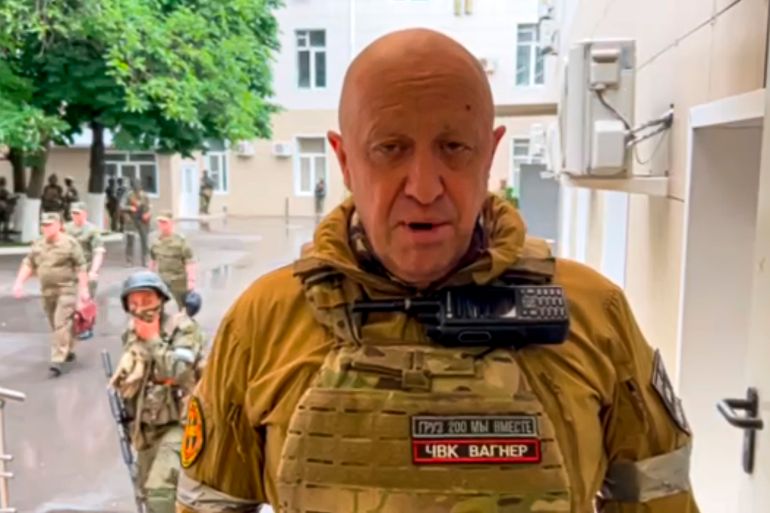Wagner mutiny reflects fault lines in Russia: Analysts
Ukraine war has produced ‘entitlement-carrying actors’ who have now clashed, moving the military action inside Russia, observers say.

There was a meme, “Bombing Voronezh”, poking fun at how Russia’s government responds to sanctions in ways that hurt itself. Today, the meme has become a reality as, after seizing the city of Rostov, mutinous Wagner mercenaries advance on the actual city of Voronezh, halfway to Moscow.
“I saw clouds of smoke from where the oil depot blew up, not far from my house,” 25-year-old Olesya from Voronezh told Al Jazeera.
Keep reading
list of 4 itemsWagner chief rejects Putin’s accusations of treason
Why Wagner mercenary force has moved against Russia’s military
Who is Yevgeny Prigozhin, the Wagner group boss?
“Periodically, [people] post videos of how in different parts of the city either a shell is falling, or they’re shooting, or they blow up a car. There are lots of soldiers on the streets. My family and I do not leave the house, but just in case we’ve packed our things.”
Olesya told Al Jazeera she has not heard of any casualties yet.
Early on Saturday, Wagner troops took control of Rostov, one of Russia’s largest cities, meeting minimal resistance from local security forces and occupying the regional military headquarters.
A video soon emerged of Wagner boss Yevgeny Prigozhin meeting with senior Russian defence officials in Rostov. The oligarch and former Kremlin ally has claimed his actions are not an attempted coup but a “march of justice” against the military high command that has “destroyed many tens of thousands of Russian soldiers’ lives”.
Marat Gabidullin, a former Wagner fighter who was deployed in Syria, told Al Jazeera he believed Prigozhin “overestimated his genius, as it happened to him before”, and does not think the mutiny will succeed. But from a military point of view, Gabidullin added, Wagner is in the right place.
“He’s in a strong position for negotiations: he managed to capture the headquarters of the [Southern Military District] group, located within the boundaries of a large city,” he explained.
“The headquarters are his hostages. To smoke him out of there, you need to attract large forces. His mercenaries have learned to fight in the city; starting an operation against them means deploying a lot of military personnel.”
But Wagner’s revolt has implications about President Vladimir Putin‘s grip on power, the Russian war effort, and the state of affairs at home.
“Among the few remaining sources of authority for the Putin regime was his longstanding claim that he restored ‘law and order’ after the ‘chaotic’ 1990s,” Kevork Oskanian, lecturer in comparative politics at the University of Exeter, told Al Jazeera.
“This perception will now lie in tatters and leave him much more vulnerable over the longer term, even if he eventually prevails.”
Historically, much of Putin’s popularity rested on restoring stability in Russians’ lives: During the post-Soviet collapse of the 1990s, Russia was plagued with turf wars between organised crime syndicates, pyramid schemes robbed citizens of money, an attempted coup left more than one hundred corpses on the streets of Moscow, while a real war raged with Chechen separatists to the south.
He did this by incorporating a wide set of business, political, religious and even criminal interests into what has been termed his “power vertical”. Up until now, he has been able to balance the competing interests of the Russian elite with a great level of success.
But as the war in Ukraine has dragged on with no clear path to victory in sight, that has empowered players such as Prigozhin, as well as Chechen leader Ramzan Kadyrov – who commands his own private militia known as “the kadyrovtsy” – at the expense of the official armed forces.
“The current unravelling of the seeming Russian political stability reflects the internal pressures and the fault lines of a country that waged an unjust and disastrous war with its neighbour,” Gulnaz Sharafutdinova, professor of Russian politics at King’s College London, told Al Jazeera.
“The war produced the inter-elite pressures, blame-shifting games and the entitlement-carrying actors who have now openly clashed, thereby moving the military action inside Russia.”